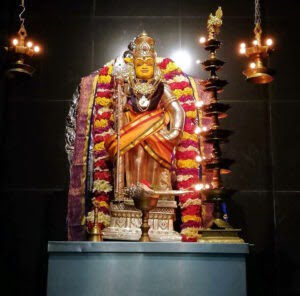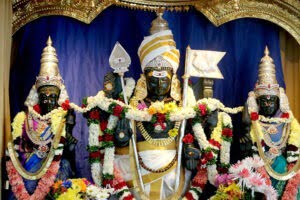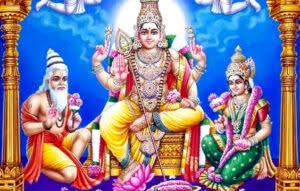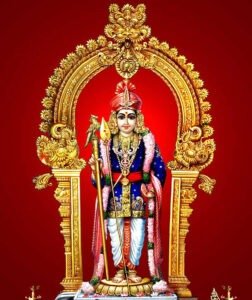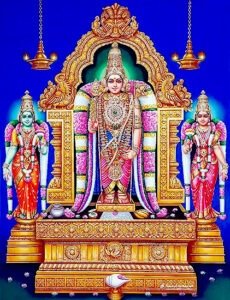Alangudi Guru Temple: Enlightenment’s Haven
The Alangudi Guru Temple, also known as the Apatsahayesvarar Temple, is a Hindu temple dedicated to the god Shiva located in the village of Alangudi in the Tiruvarur district of Tamil Nadu, India. The temple is considered to be one of the nine Navagraha temples in Tamil Nadu, each of which is associated with one of the nine celestial planets in Hindu astrology. The Alangudi Guru Temple is associated with the planet Jupiter, also known as Guru.
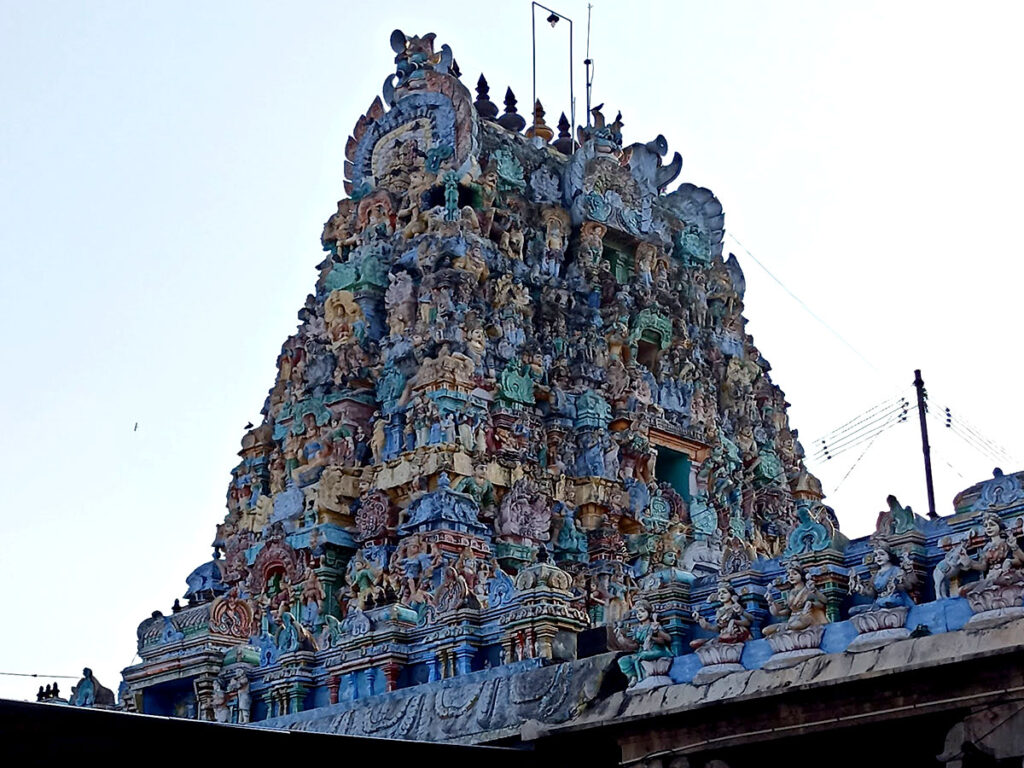
Contents
Alangudi Guru Temple History:
Origins: The temple’s origins are unclear. There are no historical records pinpointing an exact date. Legends attribute the temple’s construction to the Chola dynasty, though the earliest parts of the existing structure are believed to be from the Nayak period (16th century).
Legends: One legend associates the temple with a devout minister named Amuthokar who built it. King Masukuntha Chakravarti beheaded him for refusing to share credit for the temple. The land is said to have echoed with Amuthokar’s name, frightening the king into repentance and temple construction.
Navagraha Temple: The temple is significant as one of the nine Navagraha temples in Tamil Nadu, each dedicated to a celestial body. This temple is dedicated to Guru (Jupiter), also known as Dakshinamurthy.
Shaivite Significance: The temple’s main deity is Apatsahayesvarar, a form of Lord Shiva associated with consuming the poison that emerged during the churning of the cosmic ocean. The 7th-century Tamil poet-saints Tirugnana Sambandar and Appar both revered the temple in their hymns, making it a “Paadal Petra Sthalam” – one of the 275 sacred Shiva temples.
Read More>> Magnificent Ramanathaswamy Temple: A Marvel of Architecture
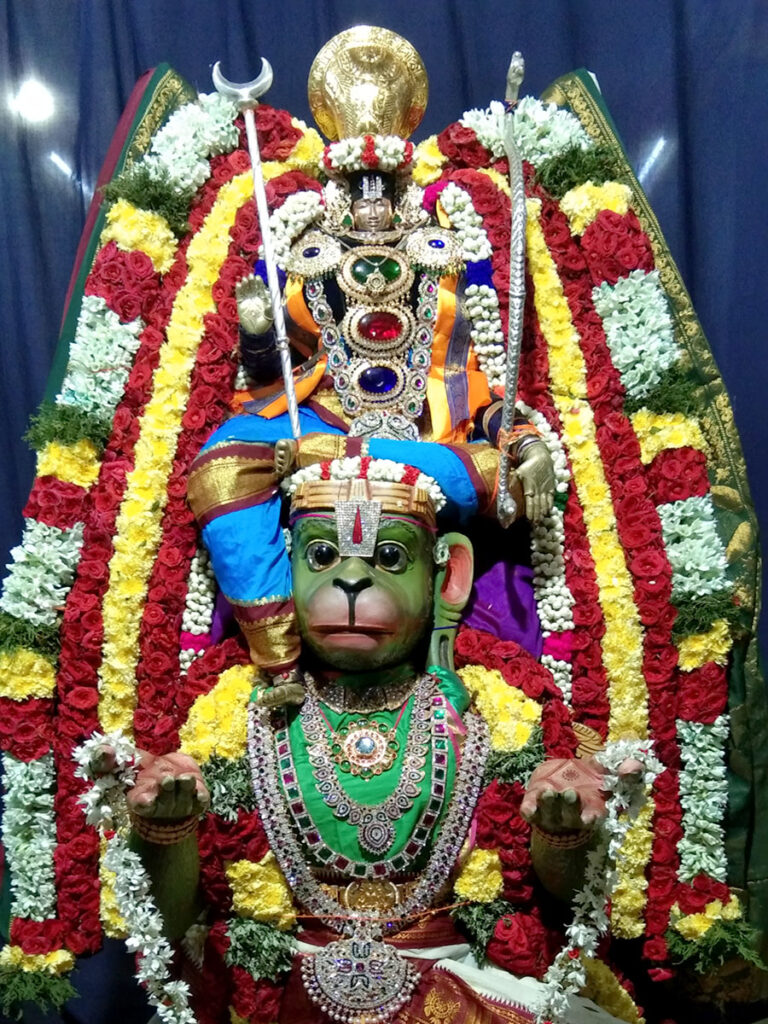
Legend of Alangudi Guru Temple:
Lord Shiva and the Poison: The most prominent legend associates the temple with the churning of the cosmic ocean (Samudra Manthan) in Hindu mythology. As the gods and demons churned the ocean to obtain divine nectar, a deadly poison (halahala) emerged. Lord Shiva, to protect the world, swallowed the poison, which turned his throat blue. Since Alangudi is believed to be the place where he drank the poison, the presiding deity is called Apatsahayesvarar, meaning “the savior during hardships.” The temple’s name, Alangudi, itself translates to “disappeared,” referring to the poison’s disappearance.
King Masukuntha Chakravarti and his Minister: Another legend tells the story of King Masukuntha Chakravarti and his righteous minister, Amuthokar. The king, envious of Amuthokar’s piety, demanded the minister transfer his merits to him. Amuthokar refused, and in a fit of rage, the king beheaded him. However, the land is said to have reverberated with Amuthokar’s name, signifying his innocence. Realizing his mistake, the king repented and built the temple to seek forgiveness from Lord Shiva.
Significance of Alangudi Guru Temple:
Devotion to Lord Shiva: The primary deity of the temple is Lord Shiva, worshipped here as Apatsahayesvarar, meaning “the one who swallowed the poison.” Legend says Shiva drank the poison that emerged during the churning of the cosmic ocean (Samudra Manthan) to save the world.
Navagraha Temple: More importantly, Alangudi is one of the nine Navagraha temples in Tamil Nadu, each dedicated to a specific planetary deity. This temple is dedicated to Guru, the embodiment of planet Jupiter (Brihaspati) in Hindu astrology. Jupiter is believed to influence knowledge, wisdom, fortune, and prosperity.
Historical Significance: The temple finds mention in the Tevaram, a collection of poems by 7th-century Tamil saint poets, signifying its historical importance.
Unique Features: Devotees visit this temple to appease the planet Jupiter, especially during its transit between zodiac signs, believing it can ward off negative influences. The temple is also known for the unusual depiction of the Dakshinamurthy form of Shiva, showing marks resembling chickenpox.
Read More>> Miraculous Powers of Shri Khade Ganesh Temple Kota Kashivpur
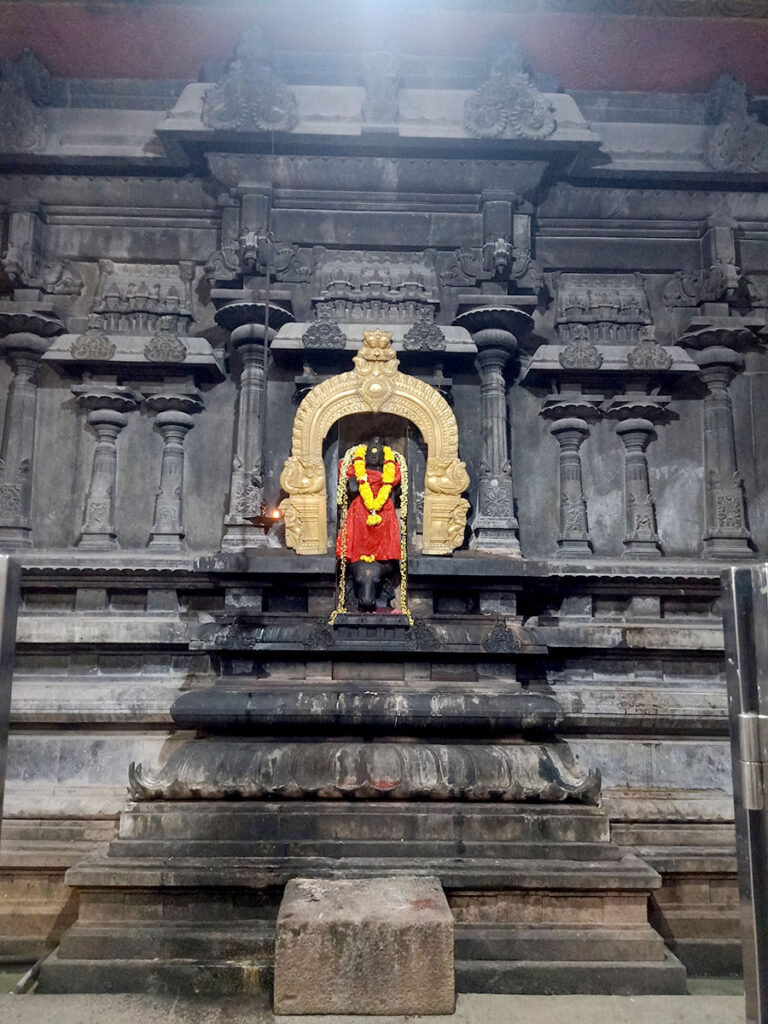
Myths & Beleifs of Alangudi Guru Temple:
Lord Shiva (Abathsahayeswarar): The temple itself is devoted to Lord Shiva, specifically his form as Abathsahayeswarar. This name translates to “the one who swallowed poison.” Mythology tells the story of the churning of the ocean of milk (Samudra manthan) by gods and demons to obtain the elixir of immortality. The churning produced a deadly poison that threatened to destroy all creation. Lord Shiva, in his infinite compassion, drank the poison to save the world, but held it in his throat turning his neck blue. This story signifies Shiva’s power to protect from harm.
Planet Jupiter (Guru): The temple is also considered one of the nine Navagraha temples in Tamil Nadu, each dedicated to a celestial being. In this case, Alangudi Guru Temple is dedicated to Brihaspati, the Hindu god associated with the planet Jupiter. Jupiter is known as “Guru” which translates to “teacher” or “preceptor.” Devotees believe praying to Guru here can bless them with:
- Excellence in education and knowledge
- Success in professions like teaching, law, and philosophy
- Strong communication and oratory skills
- Prosperity and well-being in life
- Help with overcoming challenges related to children, including childlessness
Read More>> Sugandha Shaktipeeth Shikarpur
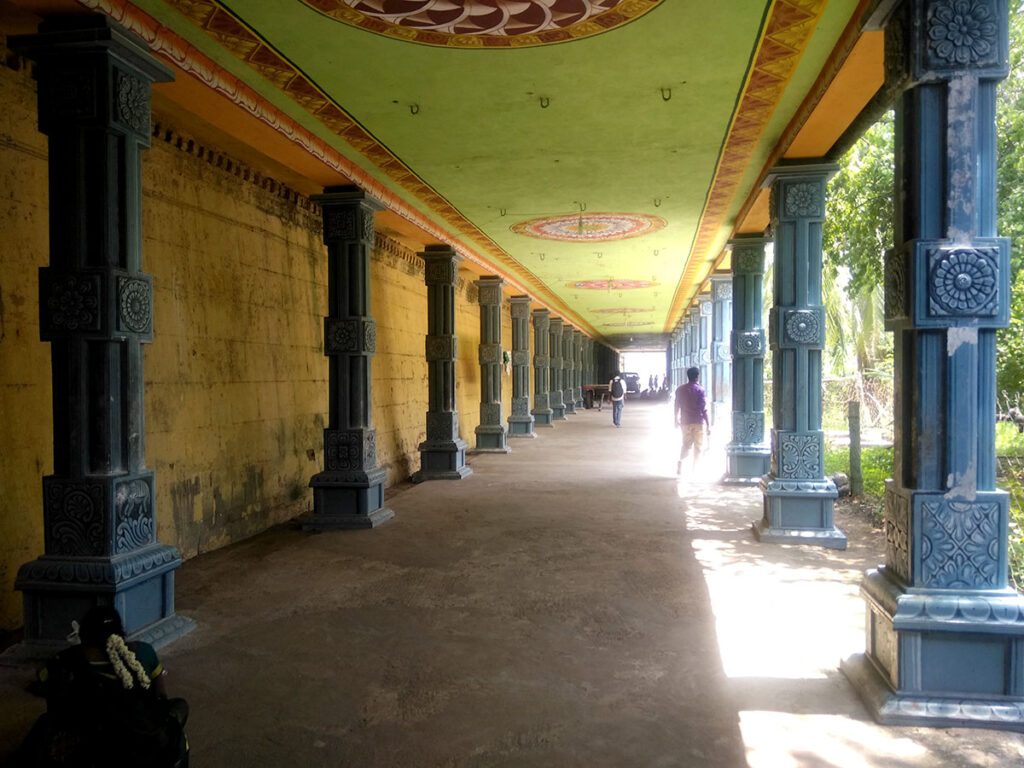
Alangudi Guru Temple Timing & Rituals:
Temple Timings
The Alangudi Guru Temple is open to visitors from 6:00 AM to 1:00 PM in the morning and 4:00 PM to 8:30 PM in the evening. There is a break between 1:00 PM and 4:00 PM. Here’s a table for your reference:
Temple Rituals
The temple priests perform six poojas (rituals) daily at various times. These poojas include:
- Kalasanthi at 6:00 AM
- Irandam Kalm at 9:00 AM
- Uchikalam at 12:00 Noon
- Sayarakshai at 6:00 PM
- Irandam Kalm at 7:30 PM
- Arthajamam at 9:00 PM
Each pooja consists of the following four steps:
- Abhisheka (sacred bath)
- Alankaram (decoration)
- Naivedhyam (food offering)
- Deepa Aradanai (waving of lamps)
These rituals are performed for the main deities of the temple, Apatsahayesvarar (Lord Shiva) and his consort, Elavarkuzhali.
Here are some additional things to keep in mind when visiting the Alangudi Guru Temple:
- There is no entry fee for visiting the temple.
- Dress modestly (preferably covering knees and shoulders) when entering the temple.
- Photography is not allowed inside the sanctum sanctorum (the innermost part of the temple where the deity is housed).
- Mobile phones should be switched off or kept on silent mode inside the temple premises.
- Devotees are expected to maintain silence and decorum inside the temple.
Read More>>Saptashrungi Bhadrakali Temple Nasik
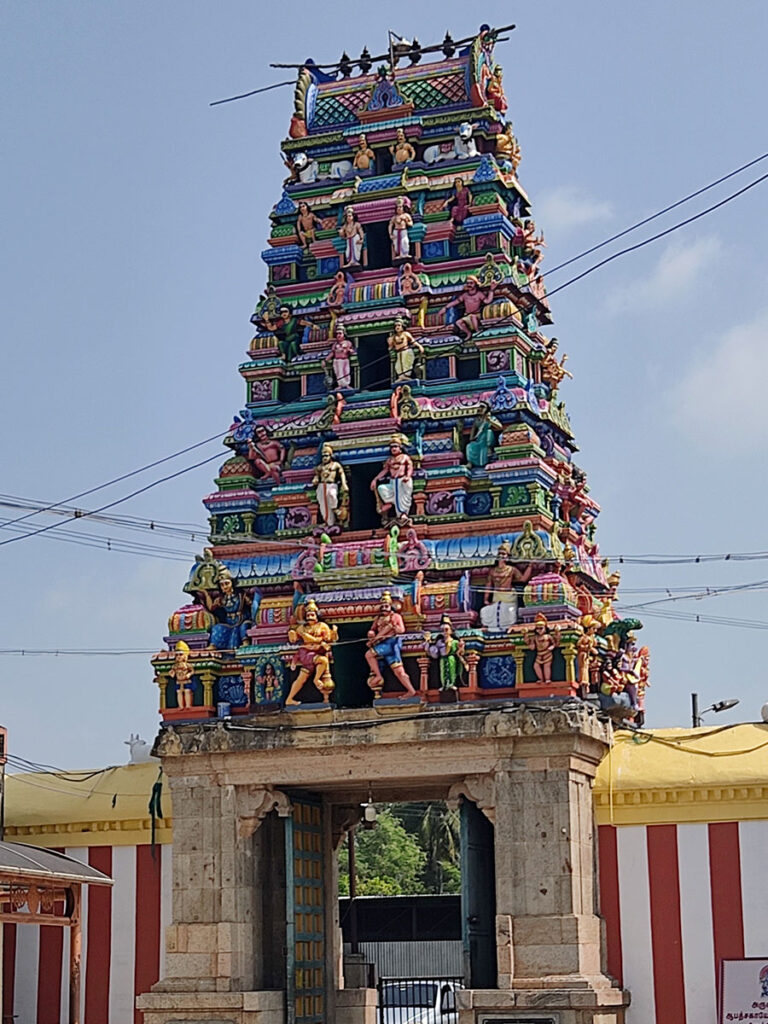
Alangudi Guru Temple Benefits:
- Blessings of Guru (Jupiter): Guru is considered the planet of wisdom, knowledge, fortune, and spirituality in Vedic astrology. Worshipping at the Alangudi Guru Temple is believed to bring the blessings and favor of Jupiter, leading to enhanced wisdom, success, and spiritual growth.
- Remedy for Jupiter Dosha: In Vedic astrology, a weak or afflicted Jupiter in one’s birth chart can lead to various challenges in life. It is believed that visiting the Alangudi Guru Temple and performing rituals can mitigate the negative effects of Jupiter dosha (afflictions) and bring about positive changes in one’s life.
- Education and Knowledge: Since Jupiter is associated with wisdom and learning, it is believed that worshiping at the Alangudi Guru Temple can enhance one’s educational pursuits and academic success. Students often visit the temple to seek blessings for success in exams and educational endeavors.
- Marital Harmony: Jupiter is also associated with marital bliss and harmony. Couples facing challenges in their relationship may visit the temple to seek blessings for marital harmony and happiness.
- Financial Prosperity: Jupiter is considered a significator of wealth and prosperity in Vedic astrology. Worshipping at the Alangudi Guru Temple is believed to attract financial abundance and prosperity into one’s life.
- Health and Well-being: Devotees also seek blessings at the temple for good health and well-being, as Jupiter is believed to have healing powers.
- Spiritual Growth: Along with material benefits, visiting the temple is also believed to foster spiritual growth and enlightenment, as devotees connect with the divine energy of Guru.
Places to visit near Alangudi Guru Temple:
- Thiruvarur: Located approximately 20 kilometers from Alangudi, Thiruvarur is famous for its ancient Thyagaraja Temple dedicated to Lord Shiva. The temple is renowned for its architectural grandeur and hosts the annual Thyagaraja Aradhana music festival, attracting classical musicians and enthusiasts from across the country.
- Kumbakonam: Situated about 17 kilometers from Alangudi, Kumbakonam is a historic town known for its numerous temples, including the UNESCO World Heritage Site of Airavatesvara Temple, the Mahamaham Tank, and the Sarangapani Temple dedicated to Lord Vishnu.
- Darasuram: Darasuram, located near Kumbakonam, is famous for the Airavatesvara Temple, another UNESCO World Heritage Site known for its intricate carvings and sculptures. The temple is dedicated to Lord Shiva and is an excellent example of Chola architecture.
- Swamimalai: Swamimalai, situated around 28 kilometers from Alangudi, is renowned for the Swaminathaswamy Temple dedicated to Lord Murugan. It is one of the Arupadaiveedu (six abodes) of Lord Murugan and is situated atop a small hillock, offering panoramic views of the surrounding area.
- Tiruchirappalli (Trichy): Trichy, located approximately 70 kilometers from Alangudi, is a bustling city known for its iconic Rock Fort Temple, dedicated to Lord Ganesha and Lord Shiva. The city also boasts other attractions like the Sri Ranganathaswamy Temple in Srirangam, Jambukeswarar Temple in Thiruvanaikaval, and the historic cityscape along the banks of the Cauvery River.
- Thanjavur: Thanjavur, also known as Tanjore, is renowned for its Brihadeeswarar Temple, a UNESCO World Heritage Site and one of the largest temples in India dedicated to Lord Shiva. The city is also famous for its art, culture, and the Brihadeeswarar Temple’s exquisite Chola architecture.
How to reach Alangudi Guru Temple:
- By Air: The nearest airport to Alangudi Guru Temple is Tiruchirappalli International Airport (IATA: TRZ), also known as Trichy Airport. From there, you can hire a taxi or use other public transportation to reach Alangudi. The airport is approximately 72 kilometers away from Alangudi.
- By Train: The nearest railway station to Alangudi Guru Temple is the Kumbakonam Railway Station (Station Code: KMU). From Kumbakonam, you can hire a taxi or take a bus to reach Alangudi. The temple is about 17 kilometers away from Kumbakonam.
- By Road: Alangudi is well-connected by road. You can reach Alangudi via bus or taxi from nearby towns and cities like Kumbakonam, Thanjavur, and Tiruchirappalli. The temple is located around 17 kilometers from Kumbakonam.







